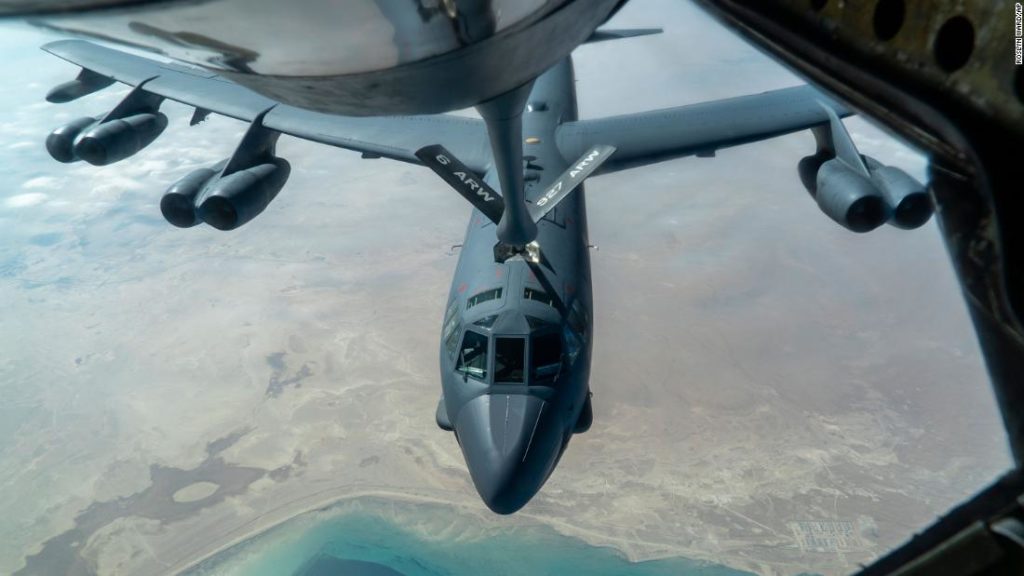Iran appealed to the UN Security Council on Thursday to stop the US from conducting what it called heightened “military adventurism” in the Gulf and the Oman Sea, including dispatching nuclear-capable bombers to the region, declaring that it did not want conflict but would defend itself if necessary.
Meanwhile, a US official with direct knowledge of the latest intelligence told CNN Friday that some Iranian maritime forces in the Gulf ramped up their readiness levels in the last 48 hours. Earlier this week, defense officials told CNN new intelligence showed Iran has been moving short range ballistic missiles into Iraq.
‘Genuinely concerned’
The drumbeat of veiled threats, public messaging and military posturing has quickened in the days before the January 3 anniversary of the assassination of Gen. Qasem Soleimani, a date that US officials fear Iran may mark by striking back.
All this is playing out as Biden prepares to enact his own policies after his January 20 inauguration. The President-elect wants to ease Trump’s “maximum pressure” campaign against Tehran, resume engagement and return to the Iran nuclear deal, all steps that hawks in the Trump administration vehemently oppose — and all reasons, some analysts say, that if Iran conducts any kind of attack, it would be carefully calibrated.
“Iran represents a real threat to US national security, particularly during this period of heightened risk due to the upcoming anniversary of the Soleimani assassination,” said Sam Vinograd, a former National Security Council official and CNN analyst.
However, Vinograd added, “I do think Iran will calibrate any attack associated with this anniversary because they do not want to box themselves in ahead of Biden coming into office and ostensibly restarting nuclear negotiations that would lead to the lifting of sanctions.”
US Central Command said last week that an attack on Baghdad’s International Zone near the US embassy was “almost certainly conducted by an Iranian-backed rogue militia group.” On Friday, Russia’s ambassador to the International Atomic Energy Association announced Iran would increase its uranium enrichment to levels it achieved before the 2015 nuclear deal — a step that will likely be seen as another provocation.
As the clock ticks down to January 3, Vinograd noted, “There is a lot of saber rattling going on.”
Soleimani’s successor on Friday marked the death of the former Quds Force commander’s death by pledging that “those who took part in this assassination and crime will not be safe on earth. It’s definite.” Gen. Esmail Ghaani told the crowd gathered for a ceremony marking Soleimani’s death that “what they have seen so far have been just some part of revenge, but they should wait for hard revenge. The time and place will be determined by the dear Resistance Front forces.”
Calling Trump a “foolish man” under the sway of Israel and Saudi Arabia, Ghaani warned that “it’s possible, even from inside your own house, there may emerge someone who will retaliate for your crime.”
Nichols told CNN that tensions are climbing at a time when Trump has fired senior civilian leaders at the Pentagon, replacing them with acting officials “who really don’t answer to anybody but Donald Trump.”
“Because there is no transparency and because we simply have no way of knowing what the President is up to, I think that should raise some concerns,” Nichols said.
‘Twisted intelligence’
Vinograd raised another concern, telling CNN, “Trump and members of his team have fabricated or twisted intelligence, including on Iran to suit personal or political objectives. It is no secret that striking Iran has been on President Trump’s bucket list for some time and with 19 days to go, he may want to go out with a bang.”
Nichols noted that “Iran is a real problem. I mean, the President may well have to do something. … The problem here is that Donald Trump, given the way he’s governed for four years, simply has not earned the benefit of the doubt on these kinds of actions.”
Iran appealed to the United Nations Secretary General to help ease tensions Thursday, asking that the US be made to abide by international law and stop “destabilizing” such a “volatile region as the Persian Gulf.”
The letter from Iran’s ambassador to the UN cited the US dispatch of advanced weaponry to the region. The Defense Department sent nuclear-capable B52 bombers to the region on Wednesday, after earlier announcing the transit of a nuclear submarine through the Gulf.
The US also currently has multiple surface warships in the Persian Gulf capable of firing Tomahawk missiles and 40,000 to 50,000 US military personnel spread out across the region, though many are not in direct combat roles, according to the Pentagon.
The Iranian letter said that while “Iran does not seek conflict, our ability and resolute determination to protect our people, to defend our security, sovereignty, territorial integrity and vital interests as well as to respond decisively to any threat or use of force against Iran must not be underestimated.”
The US official with direct knowledge of the latest intelligence said some Iranian maritime forces in the Persian Gulf have raised their readiness levels in the last 48 hours, adding that it’s not clear if the moves are defensive or are signals of a pending attack against US interests.
The official said the US does not believe the Iranian maritime moves are typical of training at sea.
CORRECTION: An earlier version of this story incorrectly stated the B-52 bombers dispatched to the region were nuclear armed. They are nuclear capable.
CNN’s Barbara Starr and Richard Roth contributed to this report.
You may also like
-
UK coronavirus variant has been reported in 86 countries, WHO says
-
NASA technology can help save whale sharks says Australian marine biologist and ECOCEAN founder, Brad Norman
-
California Twentynine Palms: Explosives are missing from the nation’s largest Marine Corps base and an investigation is underway
-
Trump unhappy with his impeachment attorney’s performance, sources say
-
Lunar New Year 2021: Ushering in the Year of the Ox

